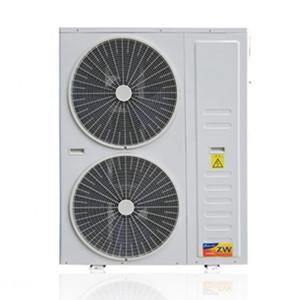Description
If you are looking for a low carbon heating system or to reduce your energy bills but a standard heat pump installation is not suitable for you, you may be interested in installing a hybrid heat pump system.
What is a hybrid heat pump?
The term "hybrid heat pump" refers to a system that uses a heat pump together with another heat source. Typically, it describes the installation of a heat pump next to a fossil fuel (natural gas, oil or LPG) boiler. The boiler can be an existing boiler, or you can consider installing a new boiler at the same time as the heat pump.
Benefit
1. Suitable for properties with high heating requirements
2. Able to stay comfortable in very cold weather
3. Helps prevent energy cost fluctuations
Is a hybrid heat pump right for me?
There are several reasons why an installer may recommend installing a hybrid heat pump system:
1. Your home has high heat needs
Your home's heat demand is the amount of heat needed to provide heating and hot water. A single heat pump on a domestic electricity supply may not provide enough heat to keep a house with high heat demands at a comfortable temperature.
A well-designed radiator (radiator or UFH) will help the heat pump run efficiently, thus minimizing running costs. You can also reduce heat requirements by improving insulation. We have more information about insulation and wind protection.
However, if you live in a large home, insulation is either impractical or too expensive, and a single heat pump cannot handle the high heat demands, your installer may be able to recommend a more specialist solution. This may include installing a hybrid heat pump, a high-temperature heat pump or a dual heat pump unit (often referred to as a "cascade" heat pump system).
Generally speaking, the maximum size of a heat pump that can be installed on standard (single phase) household power is 14kW. However, using hybrid, high-temperature or cascade systems you can find a solution to suit most home heating needs.
It's always worth understanding the costs of upgrading your supply to three-phase. If this could be done at an affordable cost, it would greatly improve electricity options for heat pumps and electric vehicle charging.
2. Stand-alone heat pumps may not save money in all situations
Replacing a boiler with a heat pump can lower your heating bills, but this depends on the efficiency of the boiler and the fuel you're switching to. For example, when mains gas prices are low, modern gas boilers can provide heat more cheaply than heat pumps.
Some hybrid systems have controls that automatically control when and how the heat pump operates based on a variety of inputs, including:
1). Electricity bill.
2). Cost of fossil fuel supply (gas, LPG or oil).
3). Time of day (if this has an impact on electricity prices).
4). Whether a solar photovoltaic (PV) system on the same property is generating or exporting energy.
Configuring the hybrid system to respond to fuel prices means the boiler only runs when it is cheaper to run than the heat pump, reducing overall running costs compared to running a fossil fuel boiler or heat pump alone.
If you are considering a hybrid system for this reason, be sure to check the assumptions used by the installer when deciding when to operate the heat pump versus the boiler. For example, you should check your gas and electric bills and compare them to what you pay now and what you expect to pay in the future. Discuss the configuration with your installer and ask them to explain its running cost calculations.
The two most likely configuration options are:
1). Run the boiler as a "supplementary" system when the heat pump is unable to provide the required heat during very cold weather. It can also help produce hot water when the control system determines this is the smartest strategy based on different tariff costs.
2). Separate the hot water and heating functions. The boiler only provides hot water and the heat pump provides heating. If this is a combi boiler (or tankless water heater) there is no need to install a hot water cylinder next to the heat pump.
Design your hybrid heat pump system
The exact design and configuration depends largely on the reasons for choosing a hybrid heat pump system. However, whatever the reason, your installer should provide the running costs of the designed system, as well as the assumptions for heat pump efficiency, boiler efficiency and fuel prices used in the calculations.
The exact configuration chosen is usually determined after discussion with the installer during system design. A more cost-effective or energy-efficient configuration will depend on your home and heating needs. Your motivation for installing a hybrid may determine the most suitable configuration, but be aware that some installers may not offer all the options you may want to consider.
We always recommend that you get quotes from multiple installers, including their opinions on the best system for your property and your requirements. Other considerations include the cost of maintaining a hybrid system, and in order to make a comparison, you need to know how much it costs to run your current heating system.
Get professional help
Leomon is a professional heat pump manufacturer. Please contact us. Our heat pump experts will give you the best advice.






